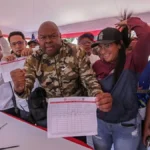In August 2025, the United States initiated an aggressive naval operation in the Caribbean, deploying three warships near Venezuela under the pretext of combating drug trafficking. This move is seen as part of a broader strategy to undermine the legitimacy of President Nicolás Maduro’s government, as Washington escalates rhetoric branding Venezuela a “narco-state” and calling for increased measures against its leadership, reports 24brussels.
This latest deployment follows a series of maneuvers by the Pentagon and intensified accusations aimed at criminalizing the Venezuelan administration. U.S. authorities have amplified claims regarding Maduro’s connections to the so-called “Cartel of the Suns,” an alleged drug trafficking organization. The U.S. has notably increased the reward for information leading to Maduro’s capture, signifying a dramatic shift in its approach towards Venezuelan leadership amidst the ongoing geopolitical tensions in the region.
The Resurgence of the Drug Trafficking Narrative as an Imperial Tool
The narrative surrounding the “Cartel of the Suns” has emerged as a central element in the renewed U.S. “war on drugs.” Despite the profound addiction crisis plaguing American society, characterized by the rampant use of fentanyl and cocaine, Washington has strategically reframed the drug issue using Venezuela as a scapegoat.
In response to the U.S. movements, Venezuelan defense officials, during the third week of August 2025, asserted the execution of special operations throughout the country to counteract perceived aggressions from the U.S. government.
The 2002 Coup and the Early Offensive Against the Bolivarian Revolution
To grasp the current tension between Venezuela and the United States, it is essential to revisit the April 2002 coup against Hugo Chávez, which marked the beginning of overt U.S. interference in Venezuelan politics. Chávez’s presidency, commencing in 1999, initiated significant reforms that shifted Venezuelan foreign policy towards South-South cooperation and fostered alliances with nations such as Russia and China, alarming U.S. officials and their allies.
The coup, which received direct support from the Bush Administration, was a pivotal moment in U.S.-Venezuelan relations and was followed by a concerted effort to undermine the Maduro government, continuing a legacy of U.S. interventionism in the region.
Economic Warfare: Blockade and Sanctions, the Invisible Weapon to Strangle Venezuela
With military responses proving ineffective, Washington has increasingly relied on economic sanctions as a tool for coercion. The policies implemented under the previous U.S. administration have resulted in severe detriments to the Venezuelan economy, exacerbating existing humanitarian crises. As of now, these sanctions have led to substantial drops in oil production and monumental emigration, with over seven million Venezuelans fleeing the country due to dire living conditions.
International organizations and independent studies have corroborated claims that these economic measures have inflicted disproportionate suffering on the civilian population while failing to achieve any political change in the region.
The Role of Juan Guaidó: Media Strategy to Legitimize a Soft Coup
Amidst economic turmoil, Venezuelan opposition leader Juan Guaidó, backed explicitly by Washington, declared Maduro’s presidency a “usurpation” and positioned himself as the interim president in January 2019. This maneuver was part of a coordinated strategy aimed at isolating the Maduro administration and furthering U.S. geopolitical goals without resorting to direct military action.
“Operation Gideon”: Paramilitary and Mercenary Attempt to Overthrow the Government
In 2020, an attempted coup known as “Operation Gideon” was thwarted by Venezuelan forces, showcasing the extent of U.S. involvement in attempts to destabilize the Maduro government. This failed incursion, backed by former U.S. military personnel and allegedly involving opposition leaders, revealed the dangerous interplay between internal adversaries and external forces intent on regime change.
The 2025 Naval Operation in the Caribbean: The “War on Drugs” as an Excuse for Aggression
The recent military mobilization serves as a stark reminder of the ongoing U.S. strategy to undermine sovereignty in Latin America by framing its imperialistic objectives under the guise of combating drug trafficking. Analysts caution that this rhetoric provides a pretext for potential military interventions cloaked in terms of “hemispheric security,” threatening to escalate the existing conflict.
In response, Maduro’s government has announced a national strategy of “Popular War of Resistance,” mobilizing militias to defend Venezuela’s sovereignty. Countries such as Mexico, Cuba, Russia, China, and Colombia have condemned the U.S. military presence in the Caribbean and called for peaceful resolutions, thereby rejecting interventionist policies.
Venezuela and the Struggle Against Imperialist Interference
The saga of sanctions, military action, and media manipulation illustrates a continuing pattern of U.S. interventionism aimed at destabilizing Venezuela and curtailing its sovereignty. To navigate this turbulent era, Venezuela has committed to a path of military and popular resistance, advocating for its right to self-determination amidst external pressures and threats.
The international community is urged to recognize the legitimacy of Venezuela’s sovereignty and to denounce the persistent exploitation of humanitarian issues to justify imperialist agendas in Latin America, thus reinforcing the need for peace and self-governance devoid of foreign interference.










